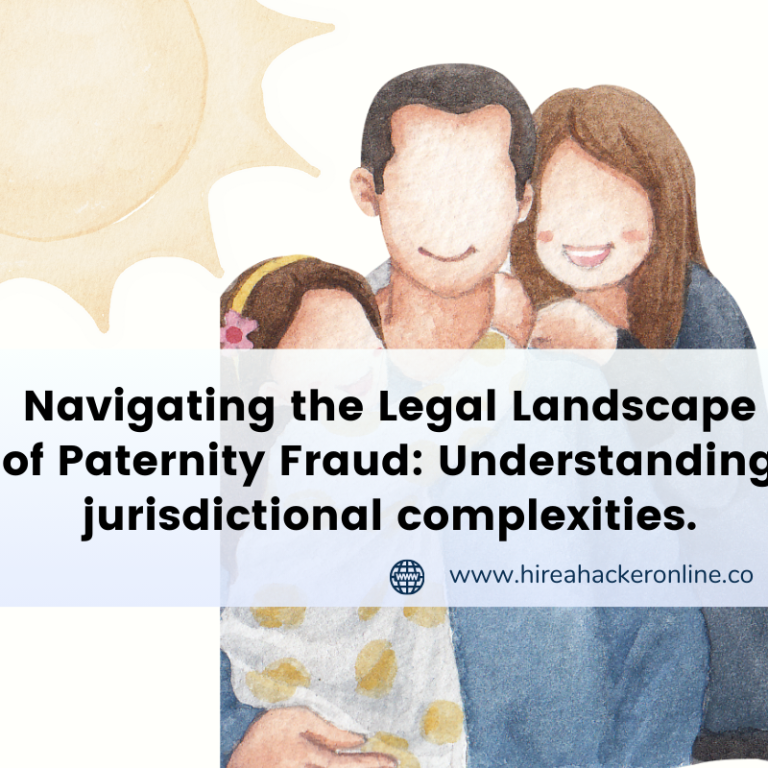When a man is wrongly named as the biological father of a child, this is called paternity fraud. This could have very bad effects on your emotions and your finances. However, it’s not easy to deal with paternity scams. The way the law works varies from place to place. Anyone interested in such a case needs to understand these complicated issues of jurisdiction. This piece looks at how different areas’ laws, court decisions, and legal processes affect cases of paternity fraud.
What Does Paternity Fraud Mean?
When a woman tricks a man into thinking he is the real father of her child, this is called paternity fraud. This trick could lead to the man being legally and financially responsible for a child who is not his. Paternity theft can happen for many reasons, like getting money or manipulating someone’s feelings. Paternity fraud usually has serious legal consequences, such as having to pay child support and take care of the kid.
What the law says about paternity fraud cases
When a court or government has jurisdiction, it means it has the legal power to make decisions about legal issues. Which laws apply and which court has the power to hear a paternity fraud case depend on the state. There are different family law rules in each state or country. These rules cover things like child support, fraud, and custody.
It is very important to know about jurisdiction when dealing with paternity fraud cases, especially when the people involved live in different areas. The way the law works in one place might be very different from how it works in another. This can make the law more difficult to understand because different areas may handle paternity scams in different ways.
Different ways that the law defines paternity fraud
One of the hardest things about paternity fraud cases is that the law doesn’t always agree on what it means. Some places let people who commit paternity fraud file a formal claim, while others don’t. Like, paternity theft might be seen as a type of fraud or misrepresentation in some U.S. states. If you live in another state, paternity theft might not be a problem at all.
Men may find it hard to question paternity decisions in some places because the law doesn’t clearly define paternity fraud. In these situations, you might need to look into the matter using related legal ideas, like fraud, negligence, or misrepresentation.
Setting up paternity in different states
Usually, the first thing that needs to be done to solve a paternity scam case is to prove who the father is. However, the steps needed to prove fatherhood are different in each state. Man is thought to be the father if he is married to the mother at the time of the birth in some states. In some places, formal paternity tests are needed to prove who the father is.
If someone thinks that paternity fraud happened, the claimed father might have to go to court to challenge the paternity determination. Different places have different rules about how to challenge paternity. Men only have a certain amount of time to dispute paternity in some places. In some places, you may not have to wait until a certain date to challenge paternity. This is especially true when fraud is involved.
What Child Support Laws Mean for People
Different places also have different child support rules. If a man is legally named the father of a child, he often has to pay child support, even if paternity fraud is later found. Men who don’t want to pay child support for a child who isn’t physically theirs will have a hard time getting around the law.
Some places have laws that let men stop paying child support if they can show they are not the father. But this doesn’t always happen. In some places, the child’s well-being is more important than the fraud, so courts keep paying child support even after paternity fraud is proven.
What the law says about paternity fraud
What legal options are available in cases of paternity fraud depend a lot on where the scam happened. In some places, you can get a variety of legal choices, such as getting back child support you paid or getting money for emotional distress. In some places, there may be no way to report paternity scam to the police.
There may be places where the man can file a lawsuit to get money for losses where paternity fraud is legal. People who file these lawsuits may want to be paid back for child support payments or for mental harm caused by the fraud. But whether or not these kinds of claims are successful rests on the laws in that area. If you’re navigating these complexities and need digital support, including online investigations, cyber intelligence, or legal evidence gathering, AITECHHACKS provides expert guidance and tools to assist in uncovering and combating digital fraud.
What DNA tests do in cases of paternity fraud
DNA testing has become an important way to find out who the father is in situations of paternity fraud. However, different places have different laws about DNA tests. In some states or countries, DNA tests may be needed as part of the formal process to prove or disprove paternity. Some places might not need DNA tests or might not let the results be used in court.
It’s also important when DNA tests are done. Men in some places only have a certain amount of time to ask for DNA testing to prove they are not the father. If this date is missed, the man could be legally recognized as the father, even if the DNA results show otherwise. Anyone who has to deal with paternity fraud needs to know what the legal standards are for DNA testing in each area.
Problems between different courts in paternity fraud
The legal problems in a paternity fraud case get even more complicated when the people involved live in different places. Laws about paternity, child support, and scams may be different in different states or countries. This can cause confusion and long court fights because different places may say they have the right to decide the case.
When a case involves more than one state, the courts may have to figure out which area has the legal right to hear it. A lot of the time, this is decided by where the child lives, where the people live, and where the fraud happened. To solve these legal problems, you need to know a lot about the rules and procedures of each jurisdiction.
Final Thought
Different areas have different legal meanings, paternity laws, and child support rules, which makes paternity fraud cases more difficult. There are different rules in each area about how to handle paternity scams, so it’s important to know the rules in your area. While DNA tests and legal challenges can help, the result of a paternity fraud case often depends on where it is heard. People who are involved in paternity fraud cases can better find justice and get through the court system if they understand how jurisdictional issues work.
Sources:




